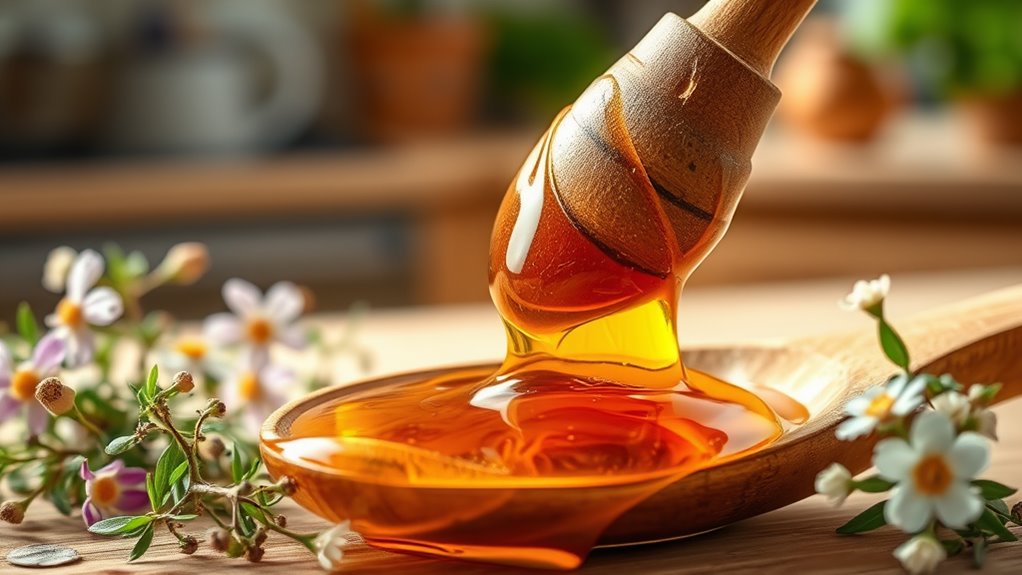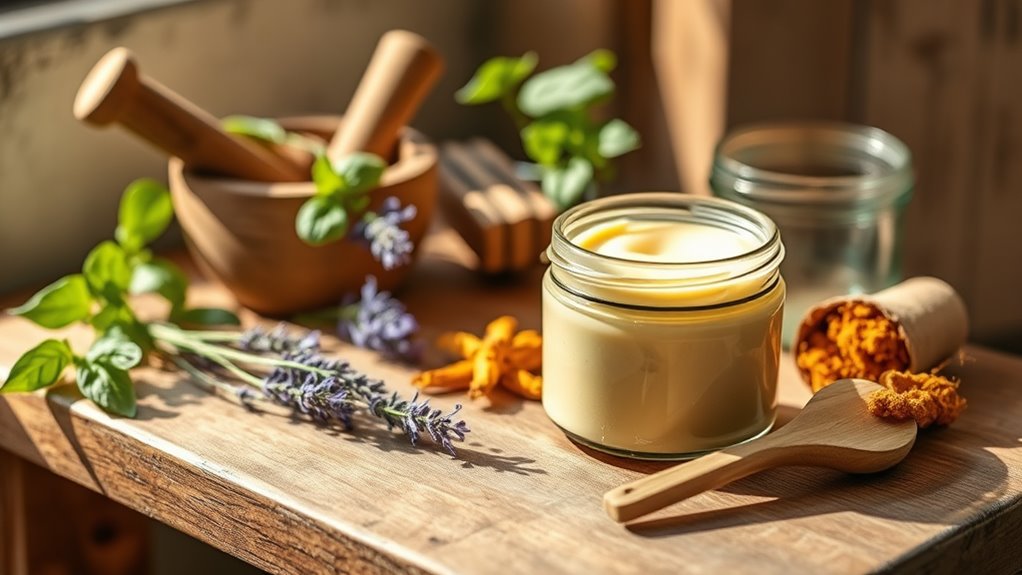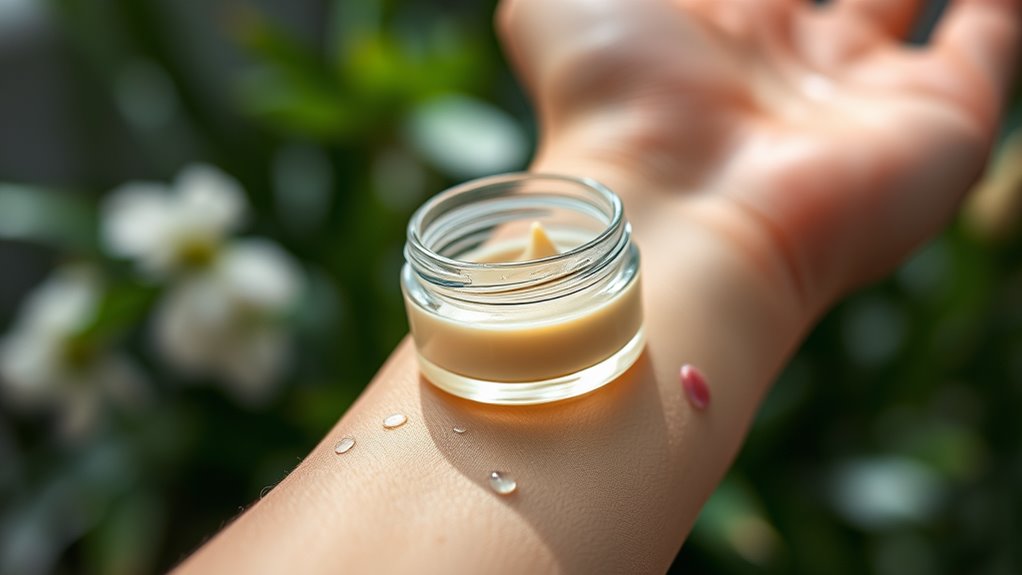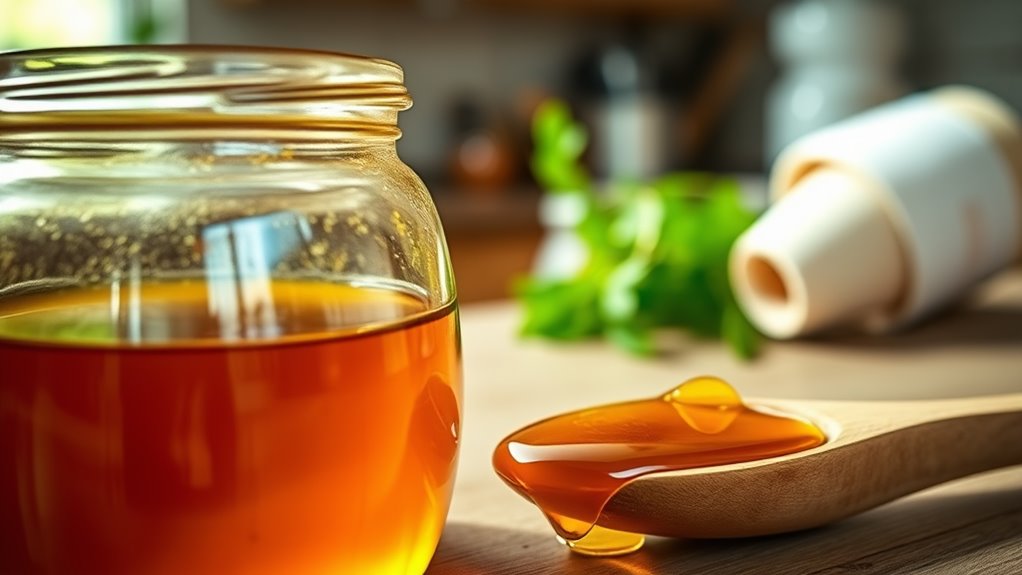Wound Healing Remedies From Your Kitchen
You can find effective wound healing remedies right in your kitchen! Honey works as a natural antibiotic, promoting healing while preventing infection. Aloe vera soothes burns and reduces inflammation. Coconut oil hydrates and protects your skin, while garlic fights bacteria effectively. Turmeric helps reduce inflammation and supports tissue repair. You might also want to explore ginger for circulation and oatmeal for gentle skin support. Keep going to discover even more healing power from your kitchen staples.
Honey: Nature’s Antibiotic
When you think about natural remedies, honey often shines as a powerful option for wound healing. Its antibacterial properties make it an effective wound natural cure. Research shows that honey can reduce infection risk and promote tissue regeneration. Additionally, it creates a moist environment that facilitates faster recovery. To use it, simply apply a layer to the wound and cover it with a sterile bandage for optimal results. Experience the healing benefits of honey!
Aloe Vera: The Soothing Succulent
Aloe vera is renowned not just for its decorative appeal but also for its impressive healing properties, especially when it comes to wounds.
Its gel contains enzymes, vitamins, and minerals that promote skin repair and reduce inflammation.
Simply apply the fresh gel directly to your wound for soothing relief and quicker healing. You’ll find this succulent enhances your natural first aid toolkit remarkably. Additionally, its anti-inflammatory compounds help soothe and reduce swelling, making it an excellent choice for burn care.
Coconut Oil: Moisture and Healing Power
Coconut oil offers remarkable benefits for wound healing, thanks to its antimicrobial properties that help prevent infection. When you apply it, you’ll also notice enhanced skin moisture, which is crucial for optimal healing. Additionally, its anti-inflammatory effects can reduce pain and promote a faster recovery. Moreover, its benefits can be further enhanced when combined with natural properties found in honey for soothing relief.
Antimicrobial Properties of Coconut
Though often celebrated for its moisturizing properties, coconut oil also boasts significant antimicrobial effects that can aid in wound healing.
Research shows its lauric acid content effectively combats bacteria, fungi, and viruses. By applying coconut oil to minor cuts or abrasions, you not only promote moisture but also create a protective barrier against infection, helping your body heal faster and more effectively.
Enhancing Skin Moisture
Maintaining proper skin moisture is vital for promoting healing and preventing further irritation.
Coconut oil’s unique composition allows it to penetrate deeply, locking in moisture effectively. Its fatty acids help reinforce the skin barrier, ensuring hydration stays intact.
Reducing Inflammation and Pain
While injuries often come with inflammation and pain, incorporating coconut oil into your wound care routine can help alleviate these symptoms effectively.
Coconut oil possesses anti-inflammatory properties that can promote healing. To use it effectively, consider:
- Applying coconut oil directly to the wound.
- Combining it with essential oils for enhanced effects.
- Using it as a moisturizer post-recovery.
- Reapplying regularly to maintain benefits.
Garlic: Antibacterial Properties
Garlic is more than just a staple in your kitchen; it’s also renowned for its powerful antibacterial properties that can aid in wound healing.
Research shows that garlic contains allicin, which fights bacteria and helps prevent infections.
To use garlic for wounds, crush a clove, mix it with a carrier oil, and apply it to the affected area for effective healing.
Turmeric: Anti-inflammatory Benefits
If you’re looking for a natural way to reduce inflammation and promote wound healing, turmeric might just be the solution you need.
Its active compound, curcumin, offers several benefits:
- Reduces swelling around wounds
- Inhibits inflammatory enzymes
- Promotes collagen synthesis
- Enhances tissue repair
Incorporating turmeric into your diet or applying it topically could significantly boost your healing process. Additionally, anti-inflammatory foods can further enhance the effects of turmeric in promoting overall recovery.
Ginger: Promoting Circulation and Healing
When you’re healing from a wound, incorporating ginger into your routine can be highly beneficial due to its ability to promote circulation and accelerate recovery.
Ginger contains gingerol, which boosts blood flow to the affected area, enhancing nutrient delivery.
You can add fresh ginger to your meals, brew it as tea, or even apply a ginger poultice for targeted relief.
Oatmeal: Gentle Exfoliation and Skin Support
Oatmeal isn’t just a breakfast staple; it’s also a fantastic remedy for your skin.
With its soothing properties and natural exfoliation benefits, oatmeal can help support healing and enhance your skin’s condition.
You can easily incorporate it into your routine with simple DIY remedies that promote skin health.
Skin Soothing Properties
Soothing the skin after a wound or irritation can be effectively achieved with oatmeal, which boasts gentle exfoliation and skin-supporting benefits.
Here are some ways oatmeal helps:
- Relieves itching and inflammation
- Provides moisture to dry skin
- Supports skin barrier function
- Contains antioxidants that promote healing
Incorporating oatmeal into your skincare routine can enhance recovery while promoting overall skin health.
Natural Exfoliation Benefits
Gentle exfoliation plays a vital role in wound healing by removing dead skin cells and promoting new cell growth.
Oatmeal, a natural exfoliant, offers a soothing effect while preventing irritation. Its saponins help cleanse the skin, reducing the risk of infection.
Incorporating oatmeal into your skincare routine enhances skin texture and supports healing, making it an excellent choice for gentle exfoliation.
DIY Oatmeal Remedies
Have you ever considered how versatile oatmeal can be for your skincare routine?
Oatmeal offers gentle exfoliation and skin support, making it ideal for wound healing. Here are four effective DIY oatmeal remedies:
-
Oatmeal Bath: Soak in colloidal oatmeal to soothe irritated skin.
-
Facial Scrub: Combine ground oats with honey for a gentle scrub.
-
Mask: Mix oatmeal with yogurt for a nourishing face mask.
-
Compress: Use soaked oatmeal for a calming compress on wounds.




